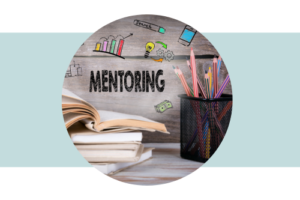How to Be a Mentee: Advice from a Young Professional
Written by Nina Banks (’23), Fellow in the Office of Personal & Career Development at Wake Forest University

When I reflect on my experiences as a student at Wake Forest, I am awe stricken by how many relationships I’ve nourished during my time here. However, in retrospect, I realize that as a newly minted college student I lacked the language and the awareness of how meaningful these relationships were to me. During my first semester, I was involved in multiple mentorship programs that matched first year students with upperclassmen. Each of these played out identically: the upperclassmen reached out to me to schedule an introductory meeting, I spent an hour asking them about life at Wake, we said our goodbyes, went our separate ways and never spoke again.
Despite these failed attempts at finding a mentor, I never felt that I was lacking quality relationships because I cultivated them in other places. I participated in events and programs where I was introduced to students who welcomed me into their campus spaces and that became the foundation from which I built my social network. In these spaces I found older students and staff that were deeply invested in cultivating an environment where students felt safe. Within communal spaces, I found it very natural to build relationships with likeminded people who I shared identities and lived experiences with. Since I had numerous people around me that I knew were knowledgeable, experienced, and reliable, I did not feel the need to seek out a formal mentor anymore. In fact, the next and last time that I engaged in a structured mentorship was during my junior year, with my work study supervisor who taught me how to navigate and advocate for myself in professional spaces.
While I did not have anyone with the designated “mentor” title, during this time I had people in my network that unofficially served as mentors to me. My mentors, intentionally and unintentionally, were people that I had the most in common with: young women of color. These were women that I felt comfortable seeking guidance from without the anxiety of having to over explain the nuances of my experience as a person with underrepresented identities in a predominantly white institution. At the time, those unstructured mentorships were exactly what I needed for my personal and professional growth because I was not in a place to devote significant time and energy to sustaining a more structured relationship.
There are two things that I want to highlight from those anecdotes: the importance of meeting yourself and others where they are, and that all mentorships do not look the same. The mentorship programs that I participated in my first year could have been incredibly enriching if I had the tools and knowledge to navigate them. If I had the wisdom then that I have now, I would have been a more proactive mentee. I would have known that, as a mentee, you have the agency to initiate mentorships and don’t have to wait for someone to offer their guidance to you. Luckily, the style of mentorship that I needed at the time formed naturally and I honored that without feeling the pressure to label that person as my mentor. An important part of my story is that my mentors were people that looked like me and had similar lived experiences. They were exactly the kind of people that I needed to help me navigate life at that age, but this doesn’t always have to be the case. You can have mentors of different racial, ethnic, gender, age and socioeconomic backgrounds. These mentors may not share the same lived experiences as you but maybe they have a particular expertise and skill-set that you want to learn from.
The key lesson to making the most of your mentorships as a mentee is to have intentionality and grace. Seeking out a mentor can be a vulnerable position to put yourself in, especially for people from underrepresented communities. You won’t get it right every time, some of those relationships may fail, but it’s so important—I cannot overstate this enough–to allow yourself to make mistakes because they are what give us the opportunity to grow.
As a recent graduate just entering the workforce, here’s some advice for my fellow young professionals:
- Create a visual map of your personal and professional network. This means dedicating time to think about and write down all the people you have a significant connection with. Ask yourself how you would characterize your relationship with that person. Hopefully you’ll start to realize that you already have people in your life who are or have the potential to be your mentor.
- Identify and list your personal and professional desires and goals. You should start by broadly considering what areas of your life this person adds value to. How would you like to intentionally develop that part of yourself through their guidance?
- Make a commitment to yourself to reach out to one person in your network that you want to be your mentor. Schedule some quality time with them to discuss more specifically which parts of your life they add value to and why you consider them a potential mentor to you. They may not respond right away and that’s okay. Give them time to reflect on whether they can see themselves as a mentor to you.
